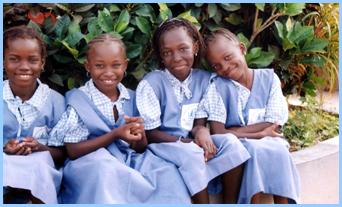SOS Children’s Villages In The Gambia

The Gambia, in West Africa, is the smallest country on the African continent. Bordering the Atlantic Ocean and Senegal, with the River Gambia running all the way through it, The Gambia is a very beautiful country. It beaches are very famous, and tourists from all over the world are attracted to them.
Despite all this, The Gambia remains a poor country. Only one-sixth of its land is arable, and the poor quality of the soil means only one crop can be widely grown: peanuts. As a result, The Gambia is very vulnerable to fluctuations in world peanut prices. The Gambia has a poor health care system, has lots of internal and external debt to pay and relies heavily on foreign aid. However, the recent discovery of oil in the country could be “a new start” for The Gambia, believes President Yahya Jammeh. The Gambia is a fairly stable multiparty democracy, and President Jammeh won a second five year term in 2001.
The country has a population of 1.5 million. The life expectancy is 54 for men and 57 for women and the country has an HIV prevalence rate of 1.2 per cent. The average per capita income is US$270 per annum.
Impoverishment and the breakdown of traditional family structures have led to an increase in the number of street children in The Gambia. SOS Children’s Villages Gambia was established in 1980, and in 1982, the first SOS Children’s Village was opened in Bakoteh, approximately ten miles from the capital city Banjul (see map). An SOS Kindergarten and Primary School were set up at the same time.
Since 1982, many more SOS facilities have been built in Bakoteh. An SOS Secondary School was opened in 1990, which has spaces for 600 students. The secondary school, as well as the kindergarten and primary school, is open to children in the local community, as well as children from the Children’s Village. SOS Youth Homes were established in 1991, and these are where Village teenagers over the age of 16 live. The teenagers live here to help them prepare for independence and adult life. They are looked out for by a youth advisor who assists them in finding employment. He/She also helps the youths continue with their education, whether this is at school or at a vocational training centre. The advisors are also on hand if the teenagers have any problems and need someone to talk to. The teenagers can also turn to their SOS mothers at any time.
In 1984, an SOS Vocational Training Centre was set up in Bakoteh to offer village and community youths the opportunity to gain the practical skills needed by the local economy. Carpentry, metalwork and car mechanics are just a few of the courses on offer. A second Vocational Training Centre was opened in 1999 which offers training to all SOS staff and mothers.
10,000 patients are cared for each year at the SOS Medical Centre. The medical centre offers outpatient care for mothers and children. It is fully equipped, and contains an X-ray room, a maternity ward, a children’s ward and a pharmacy, amongst other things. With health care provision in The Gambia being so poor, the SOS Medical Centre was very much welcomed by the local population of Bakoteh. To further improve the lives of people in Bakoteh, SOS Children’s Villages Gambia helped set up two community centres in 2004.
At present, there is one SOS Children’s Village in The Gambia. Construction is due to start shortly though on a second village in the eastern town of Basse, and the village will be completed in December 2006.
This past year has been very eventful and memorable for the children at SOS Children’s Village Bakoteh. In summer 2004, a number of children visited SOS Children’s Village Kaolack in neighbouring Senegal, and they had a wonderful time. They made so many new friends, and it is hoped that the children from the two Villages can all meet again soon. Eid Al Fitr last year was a huge day at the Children’s Village. There was a really big celebration to mark the end of Ramadan. The SOS mothers cooked lots of food, and everyone had a great time.
At the three SOS schools, the children are all doing really well, and pass rates are high. In the primary school end-of-year exams, there was a 100 per cent pass rate in six subjects, including French and English. At university level, one SOS teenager has been offered a place at an American university to study medicine.
A picnic on the beach was just one of the highlights for the kindergarten pupils last year. They ate and drank lots of nice food, and had a great time playing together in the sand. Social studies students at the primary school visited Abako Nature Reserve recently to learn more about wildlife conservation. The children love these kind of school trips.
